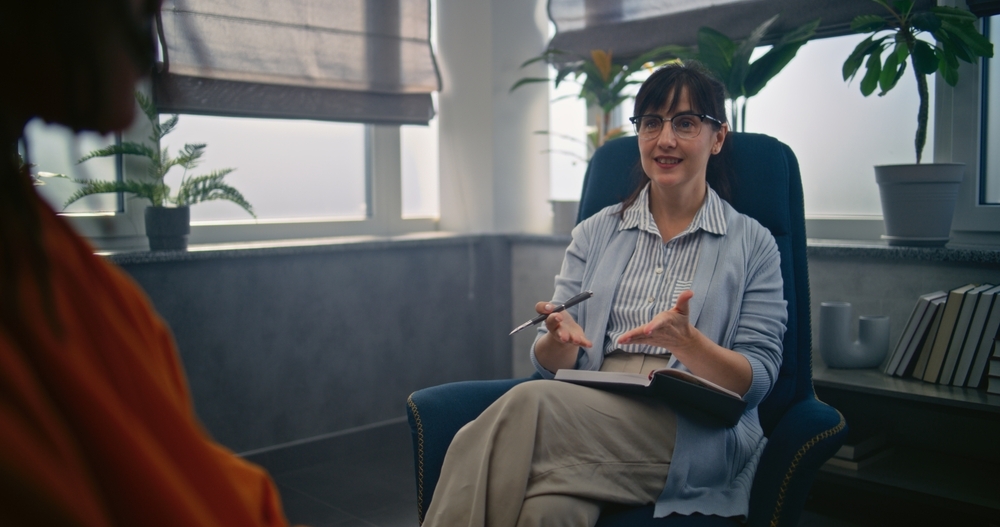
Written by:

Medically Reviewed by:
Last Updated:
March 10th, 2025
Psychotherapy
When you read the word “therapy”, what do you imagine? Sitting (or lying!) on a sofa, perhaps, a grey, stern-looking therapist sat opposite you. But that couldn’t be further from what happens during psychotherapy at Liberty House. Psychotherapy for addiction helps you sort through all the trauma, emotions and personal struggles that you have been carrying around with you for years and which have culminated in substance abuse or addictive behaviours. You can then begin shedding some of that load for a brighter future.
What do we mean by psychotherapy?
Sometimes, it can be hard to understand why we do the things we do. The definition of addiction is continuing to drink, do drugs or engage in addictive behaviours even though it is evident that you are causing yourself harm. This can be very confusing, both for yourself and your loved ones, who can’t understand why you don’t just stop.
Psychotherapy is the chance to sit down with someone who understands why we act in certain ways. They have the training and experience to listen, ask the right questions and help you make sense of what’s going on inside your head. That is really what psychotherapy is about – understanding what is making you feel and act the way you do and helping you find positive alternatives.
Lots of people used to think therapy was only for people with “serious problems”, but that’s not true. Talking to a therapist can help anyone – whether you’re feeling sad, stressed or just want to understand yourself a little better.
How does psychotherapy work?
Psychotherapy works on the idea that our thoughts and feelings can influence how we act. For example, if you are feeling angry or sad, you might do things that aren’t good for you, like picking fights or avoiding friends. In psychotherapy, you talk about these feelings to understand why they’re there.
When it comes to psychotherapy for substance abuse recovery, the goal is to look past the drugs and alcohol to the root causes. There might be deep feelings – like stress, worry, or past hurts – that make you turn to those things.
Sometimes, psychotherapy helps resolve the underlying issues altogether; other times, it teaches you how to manage them, and sometimes, you learn that you just have to accept them. In either case, By understanding how those feelings are driving your substance abuse, you can choose a reaction that doesn’t involve alcohol, drugs or addictive behaviours.
Psychotherapy is usually done through individual sessions but it can also be group therapy with recovery peers, your partner or your family. At Liberty House, our programme of therapies includes all of those for a well-rounded experience that involves both you and your loved ones.
The benefits of psychotherapy when battling addiction
Various short- and long-term benefits of psychoanalytic psychotherapy for addiction have made it a key component of rehab treatment. Some of the most exciting benefits include:
Understand why addiction happened
Psychotherapy takes a microscopic look at how stress, mental health, difficult feelings or life events are affecting you. For example, trauma-focused psychotherapy for drug addiction looks at how traumatic past experiences trigger substance abuse. Psychotherapy then helps heal the wounds the trauma has caused, so you don’t need to use drugs as a plaster.
Change unhelpful thoughts
Addiction can make you think things like “I need this to feel okay” or “I’ll never get better.” Psychotherapy helps you catch those thoughts and turn them into ones that push you forward, like “I’m strong enough to do this.”
Spotting what pushes you toward addiction
Everyone has things that make them feel upset, stressed or tempted to use. Psychotherapy for managing cravings in addiction recovery helps you figure out what your “triggers” are. They could be certain people, events or places, but once you know what sets you off, you can practise handling those feelings better.
Finding your ‘why’ to stay sober
Psychotherapy can help you understand why you want to get better. Maybe it is to feel healthier, fix broken relationships or just enjoy life again. When you know your reasons, it is easier to stay focused and keep going when things get rough.
Skills you can use forever
Psychotherapy gives you real, practical skills you can use every day. Whether you’re feeling stressed, sad or tempted, these tools will help you stay in control and make healthy choices for years to come.
Key ways to engage in psychotherapy for addiction
At Liberty House, we offer different types of psychotherapy to help you understand and manage your addiction. Each one works a little differently, so there’s something for everyone:
Cognitive-behavioural therapy (CBT)
CBT is like detective work for your thoughts. Sometimes, your brain tricks you into thinking things that aren’t true, like “I can’t handle this without drugs” or “I’m not strong enough to stop.” In CBT, your therapist helps you spot those thoughts, figure out where they came from and prove them wrong. The more you practice, the easier it gets to choose better thoughts that help you stay sober.
Dialectical behaviour therapy (DBT)
Addiction can make it feel like your feelings are so big that the only possible way to cope with them is to use drugs or alcohol. DBT teaches you that there are other ways to cope, such as mindfully breathing through tough moments. You will also learn how to talk to people more confidently and ask for help when you need it. These are very important aspects of psychotherapy for managing cravings in addiction recovery.
Motivational interviewing (MI)
Motivational Interviewing is all about helping you find your why. Your psychotherapist will listen, encourage and help you figure out what really matters to you. Maybe you want to feel proud of yourself again, rejoin your family or just wake up feeling strong and clear-headed. MI gives you space to explore those reasons and use them to take steps toward recovery, one choice at a time.
Family therapy
Addiction can ruin relationships, and loved ones often don’t know how to help, even if they want to. Family therapy helps mend broken bridges and teaches everyone how to be part of their recovery in a positive way. It is an important form of psychotherapy where everyone can ask questions, share feelings and learn how to support each other as a team.
Why it is worth continuing psychotherapy after treatment
Life after rehab can feel a bit wobbly sometimes, but psychotherapy can be like a safety net that is there to catch you if you slip. Liberty House offers free weekly group therapy sessions for your first year out of rehab. These sessions provide a space to work through problems, big or small before they grow and to keep learning and practising the tools that keep addiction away.
Remember, when you show up for psychotherapy, you’re showing up for yourself – and that makes a huge difference both during rehab and afterwards.
Delve deep and stride forward with psychotherapy
Real change begins on the inside, and psychotherapy helps you figure out what’s really going on. At Liberty House, you will work through the tough emotions, untangle confusing thoughts and learn how to move forward feeling stronger and clearer. Reach out today and let psychotherapy peel back the layers to reveal a brand-new you.
Frequently Asked Questions
(Click here to see works cited)
- UK Rehab. “Psychotherapy | Rehab Therapies and Models.” UK Rehab, https://www.uk-rehab.com/rehab-therapies/psychotherapy/. Accessed 17 December 2024.
- UK Rehab. “Rehab Therapies and Models | Therapies for Addiction Treatment.” UK Rehab, https://www.uk-rehab.com/rehab-therapies/. Accessed 17 December 2024.
- National Institute of Mental Health. “Psychotherapies – National Institute of Mental Health (NIMH).” National Institute of Mental Health, https://www.nimh.nih.gov/health/topics/psychotherapies. Accessed 17 December 2024.
- Yue H, Pena E. Addiction Psychotherapeutic Care. [Updated 2022 Nov 11]. In: StatPearls [Internet]. Treasure Island (FL): StatPearls Publishing; 2024 Jan-. Available from: https://www.ncbi.nlm.nih.gov/books/NBK587365/. Accessed 17 December 2024.
Disclaimer:
The availability of therapies may vary across UKAT centres. The specific therapies provided will be determined based on your treatment plan and the programme offered at your chosen facility. All treatments are subject to clinical assessment and programme availability at the time of admission. For further details on the therapies included in your treatment plan, please contact our admissions team.







